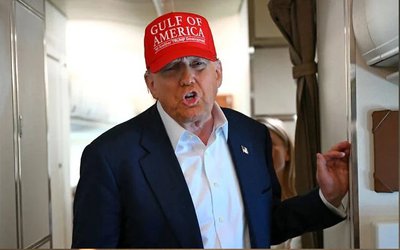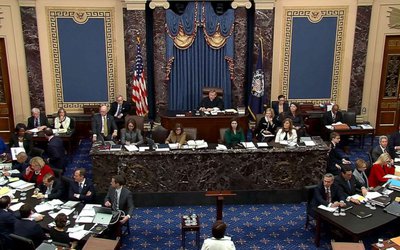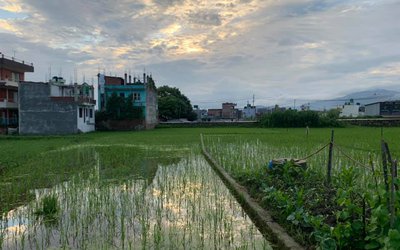The current federal parliament, first elected under the new 2015 constitution, promised with much fanfare five years of stability but has delivered to the county since December last a roller-coaster ride of insufferable instability. To make the ride more tumultuous, the Supreme Court has stepped in with breath-taking judicial hyper activism that has effectively transferred sovereignty from the parliament to the Supreme Court.
This past July, Nepal experienced two major bombshells: first by the Supreme Court forcing Deuba's appointment onto the president and parliament, and the second just this week by Rabindra Mishra, the chair of Sajha-Bibeksheel party that aims to be an alternative to the stale and incompetent Kangress-Communist combo of the last three decades. Let's take them up sequentially.
Through a street-smart but unprincipled and party procedure-violating alliance, the Marxist-Leninists and the Prachanda Maoists did manage to cobble together an unprecedented two-thirds majority in parliament. And the voters hoped to see a solid and undisturbed government focused on development for its full term. On the contrary, what they saw was fatal fratricidal infighting not just among the ruling party but also among the opposition groups.
The personalized warfare that was bereft of political principles among the ruling communists had paralyzed the government: Prachanda and Madhav Nepal from the same party were intent on taking down Oli who was as determined not to be overthrown. Oli then did what any prime minister in a Westminster model parliamentary democracy does and had done in Nepal in 1994, 1999 and 2002: he opted to go the voters.
In a normal functioning political system, when there is a political problem, it is solved in a political forum, be it the parliament, the various party committees or the inter- and intra-party discussion mechanisms, or the voters. In the politically dysfunctional Loktantra of Nepal, they failed to do that and instead appealed to the judiciary to solve it for them, thus proving that this political dispensation is unable to solve political problems within the framework of the constitution they themselves designed and promulgated.
The judiciary, feeling politically empowered, not only resurrected a dysfunctional parliament the second time but ordered an individual (Deuba who did not command enough members of his own party to even register a vote of no confidence and thus even to be actually called an opposition) to be appointed prime minister within 24 hours.
The criticism of the Supreme Court for this political activism was not just for a blatant partisanship and arrogating unto itself the right of a parliament, but also for its declaring that party decisions and discipline are irrelevant. Effectively, now MPs can ignore a party whip to vote for whatever they like. It thus makes this political dispensation partyless, but unlike the Panchayat with a strong referee, totally anarchic! MPs are horse-trading for personal benefits with gusto, the result being that neither PM Deuba nor Prachanda on whose legs Deuba's premiership rests can form a functioning cabinet three weeks after being sworn in!
And this is not the first time a court's decision has delegitimized an entire dispensation. In the mid-1990s, when UML's Man Mohan Adhikari dissolved the house and asked to go for a fresh mandate it opined favoring opposition Kangress, saying that the parliament could not be dissolved "as long as possibilities of forming any government remained". It blunted one of the few instruments available to a prime minister to keep his own and the opposition members under discipline. It also led to experimentation with every unsavory and principle-less permutations of government possible with shameful examples of corruption and horse-trading along the way.
Moreover, this judicial overkill contributed in no small measure to the Maoist insurgency that was fueled by public revulsion towards the system and its delegitimization. This July's Supreme Court decision has similarly opened up parallel possibilities for the upcoming future. Crony capitalist corruption, nepotism, partisanized civil service and police force, coupled with decision-making not by legitimate party committees but kitchen-cabinet family coteries of neo-feudal party bosses, are disgustingly blatant and there for all to see.
All this is happening even as very diverse groups of religious as well as pro-monarchy activists and frustrated Maoists are coming out openly to call for an abolition of this dispensation. They range from Keshar Bahadur Bista's Rashtra Shakti Nepal on the allegedly traditional right ("alleged" because Nepal's Right espouses more socialism and its Left more crony capitalist liberalism than globally comprehensible!) to ex-Maoist Chandra Bahadur Thapa Sagar's Rashtrabadi Kendra Nepal and some eighty plus motley groups in between. None of them get along with each other or see eye-to-eye on many issues except to agree that this system does not work, that secularism and federalism must be scrapped, and (for many but not all) the monarchy should be brought back.
The country faces local elections in less than a year, and national polls in a year and a half if not earlier. Kangress, UML as well as Prachanda Maoists face a crisis of legitimacy as they have been unable to hold their party conference and chose a new leadership well past the constitutionally mandated five years. The rising public discontent, when added to big parties' sheer incompetence, amazing acrobatics of unprincipled alliances, horse-trading and conflict-of-interest decisions, points to highly unpredictable times ahead.
Into this volatility, Sajha-Bibeksheel party's Rabindra Mishra had submitted a discussion paper for consideration of the party asking for the scrapping of federalism and calling for a referendum on secularism. He describes how provinces have become not only useless parasites feeding on the public budget with little service to show for it but also being a hotbed of corruption. And he argues that the way federalism is heading is quickly becoming a grave security threat to the unity of the country. He also argues that the public dissatisfaction imposing secularism (which was not even an agenda of the 2006 political agitations) under foreign tutelage without any meaningful discussion is leading to the emergence of Hindu fundamentalism, that it can be stymied only by putting this matter to a public referendum.
On the republicanism, he is basically silent and only mentions that it was not home-grown but subsequently imposed by outside forces with main political parties functioning as puppets. He does not call for a restoration of monarchy but argues that, if corruption and mal-governance is to increase as is happening now, and if the office of the president fails to be a dispassionate referee and instead functions in the interests of the party from where the president's career began, the popularity of King Gyanendra and a popular clamour for a return to monarchy is bound to increase. The threat to republicanism is thus not from monarchists but from republicans themselves. Hence the need for an alternative politics to the one that has been practiced by the main big parties these last fifteen years.
The swift and explosive reaction to Mishra's discussion paper is of two kinds. One group (a majority it seems judging from comments in the social media) of mainly non-partisan public has been very supportive of Mishra's thesis. They especially find resonance in his marshalling of historical facts that cannot be disputed but which had been airbrushed away from public discourse through a Nepali-style "political correctness" of 2005 Loktantricksters.
The other, mainly partisan journalists and self-styled civil society leaders associated with the Maoist, Kangress, Madheshi groups and the UML, have resorted primarily to ad hominem attacks against Mishra. And the reasons are not difficult to discern: these have been the cheer-leaders of the 2005/06 regime change, mostly at the behest of foreign forces, and have been stung by his institutionally exposing what they had comfortably chosen to sweep under the carpet. It has also exposed their slavish worship of the leadership in big parties that has failed multiple times but continues to rule the roost for the last quarter of a century!
Quite instructive is one of the few rather polite criticism of Mishra from Pranaya Rana of The Record. Given that he is one of the brighter and effective of journalists to emerge from the younger generation, it is surprising how uncritically even he has absorbed the untenable narratives of 2005/2006. As an example, unlike what he says with Nepal having no local-level representations between 1997-2017, Nepal had local government during the Panchayat (I remember holding the first mayoral debate between Harbol Bhattarai of the Kangress and Roop Jyoti at the GAA Forum way back in 1981!) and more so under the 1990 multiparty dispensation.
It was Kangress that failed to either extend the term of local bodies or hold elections for them in 2002 (and for the national parliament!). And it was Loktantra that chose loot over governance with their "all party confabulation" between 2006-2017, ameliorated only by the donor-civil service alliance that put a small check on it with the more accountable Ward Citizen Forum – which the parties abolished in 2017! There are similar problems with his being unable to distinguish between corruption and blatant loot, of asking for more time for failed leaders to clean up the mess they are benefitting from, brushing aside criticism of secularism's imposition as "conspiracy theory" despite then speakers of parliament confessing to it, and many more.
Opening up a debate on these swept-under-the-carpet issues will be a good thing for democracy. If, as a result of this, we could see the departure of the failed leaders of the last quarter century in all these big parties; if a new and younger leadership could rise to the challenge of seeing and advocating for not party but larger national interests; if they could bring together diverse forces from Monarchists to Biplavites and others in between rather than have more polarization, democracy might have a fighting chance in Nepal.

Dipak Gyawali
Gyawali is Pragya (Academician) of the Nepal Academy of Science and Technology (NAST) and former minister of water resources.
- Navigating An Uncharted, Unravelling World Order
- Jun 19, 2025
- Overcoming Indo-Pak Conflict The Dara Shikoh Way
- May 13, 2025
- Re-Thinking Democracy: Why South Asians Are worried
- Mar 17, 2025
- Nepal’s Governance Mired In Endemic Corruption
- Feb 20, 2025
- What Might The Age Of Trump Look Like?
- Jan 22, 2025












